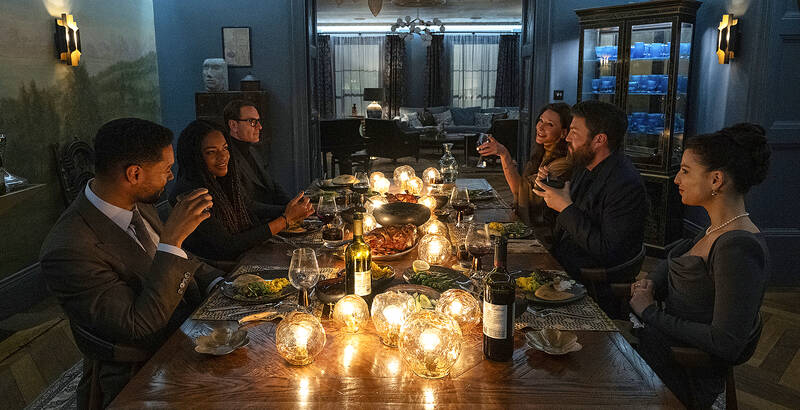If you’re hosting a dinner for half a dozen British intelligence agents with the aim of ferreting out a mole, what should you cook?
For George Woodhouse (Michael Fassbender), who’s preparing for four colleagues, plus himself and his wife, Kathryn St. Jean (Cate Blanchett), who, like him, is a high-level operative, it’s chana masala with a few drops of truth serum.
“Will there be any mess to clean up?” Kathryn asks her husband as they’re getting ready.

Photo: AP
“With any luck,” he responds.
So goes much of the crackling patter of Black Bag, Steven Soderbergh’s delicious marital drama cloaked as a sleek spy thriller. Lean and taut, the 93-minute Black Bag, in Taiwan theaters on April 30, is more a sizzling amuse-bouche than full-course meal, but it’s simmered to perfection.
George and Kathryn, as fellow agents at London’s National Cyber Security Center, don’t seemingly have what you might call a traditional marriage. Each has their own secret ops, leaving large swaths of their lives off limits to the other. When George asks where Kathryn is flying off to on Wednesday, she shrugs with a smile, “Black bag.”

Photo: AP
In the movie’s opening scene — a slinky tracking shot that trails George into and out of a nightclub — an agent named Meacham (Gustaf Skarsgard) gives him the assignment to track down the mole, with the added wrinkle that Kathryn can’t be dismissed as a possible suspect. A cyber-worm device called Severus that’s capable of hacking into nuclear facilities has gone missing. The fate of the world, as it so often is, is said to be at stake.
But, really, the state of George and Kathryn’s marriage is what interests us. Extreme though their situation is, their union is one that, like any couple, is built on trust and devotion, even if their professional lives demand the inverse. When George, lying on top of Kathryn tells her he’d do anything for her, she coos, “Would you kill?” It’s a fair-enough test to the bounds of wedded bliss, sure, but her second question matters even more. “Would you lie?”
Over that dinner — a scintillating set piece around a darkened dinner table inside their London town house — we can quickly gather just how much the truth means to George. He’s renown for his powers with a polygraph. As a youngster, he even brought down his own father, uncovering his affair.

Photo: AP
“I don’t like liars,” George says through clenched teeth.
They’re joined by Colonel James Stokes (Rege-Jean Page); the in-house psychologist Dr. Zoe Vaughan (Naomie Harris); the carousing spy Freddie Smalls (Tom Burke); and the newest NCSC recruit, cyber specialist Clarissa (Marisa Abela). Both are paired off in clandestine relationships that quickly emerge, among other secrets. More than state secrets, infidelity dominates the conversation.
Fassbender’s spook is an agent of precision. He wears gleaming black-framed glasses. When only a few drops of sauce land on his cuff, he immediately withdraws to change his shirt. Hard as it would seem, Fassbender has found a character almost as dispassionate and monotone as his methodical assassin in David Fincher’s The Killer.
This time, though, he’s not a loner. Blanchett’s Kathryn is kept more at a remove from us. She’s mysterious and aloof — a femme fatale, maybe, we’re led to wonder. An “aroma of hostility” accompanies her, Zoe tells her in a psych evaluation. Is she the mole?
This is an insular film, taking place mainly in crisply composed interiors, aside from the lake George occasionally fishes for bass in. There, in a fitting encapsulation of a movie full of smooth surfaces with currents twisting underneath, the camera gently rests on the water’s surface.
Black Bag follows a run of agilely directed thrillers by Soderbergh made with screenwriter David Koepp (Presence, Kimi). They are both at the height of their almost-too-easy powers; the script, especially, is peppered with delectable dialogue. Their movie adopts the air of menace and suspicion of a John Le Carre novel, yet hinges on the sturdiness of its married couple, like a super spy version of Nick and Nora from The Thin Man or a more cerebral Mr. & Mrs. Smith.
All of the supporting players — while they make up a fine ensemble — are ultimately playthings in their game of love. In a casting coup, a former James Bond — Pierce Brosnan — drops in late in the film as Arthur Stheiglitz, the head of NCSC. In his handful of scenes, Brosnan is rageful and ferocious, chomping into both Ikizukuri (prepared live fish) and the scenery.
His presence both enlivens a movie already humming with the uber-cool chemistry of Blanchett and Fassbender while transforming Black Bag into a twisty rejoinder to that notoriously skirt-chasing spy. Here, Mr. Bond, is how sexy monogamy can be.
While directing a satellite to peer down upon his wife on some unknown mission in Europe, George explains their mystifying dynamic to Clarissa: “I watch her, and she watches me. If she gets into trouble, I will do everything in my power to extricate her.”
In her response, Clarissa speaks for everyone: “That’s so hot.”

The Taipei Times last week reported that the rising share of seniors in the population is reshaping the nation’s housing markets. According to data from the Ministry of the Interior, about 850,000 residences were occupied by elderly people in the first quarter, including 655,000 that housed only one resident. H&B Realty chief researcher Jessica Hsu (徐佳馨), quoted in the article, said that there is rising demand for elderly-friendly housing, including units with elevators, barrier-free layouts and proximity to healthcare services. Hsu and others cited in the article highlighted the changing family residential dynamics, as children no longer live with parents,

Oct 20 to Oct 26 After a day of fighting, the Japanese Army’s Second Division was resting when a curious delegation of two Scotsmen and 19 Taiwanese approached their camp. It was Oct. 20, 1895, and the troops had reached Taiye Village (太爺庄) in today’s Hunei District (湖內), Kaohsiung, just 10km away from their final target of Tainan. Led by Presbyterian missionaries Thomas Barclay and Duncan Ferguson, the group informed the Japanese that resistance leader Liu Yung-fu (劉永福) had fled to China the previous night, leaving his Black Flag Army fighters behind and the city in chaos. On behalf of the

I was 10 when I read an article in the local paper about the Air Guitar World Championships, which take place every year in my home town of Oulu, Finland. My parents had helped out at the very first contest back in 1996 — my mum gave out fliers, my dad sorted the music. Since then, national championships have been held all across the world, with the winners assembling in Oulu every summer. At the time, I asked my parents if I could compete. At first they were hesitant; the event was in a bar, and there would be a lot

Smart speakers are a great parenting crutch, whether it be for setting a timer (kids seem to be weirdly obedient to them) or asking Alexa for homework help when the kids put you on the spot. But reader Katie Matthews has hacked the parenting matrix. “I used to have to nag repeatedly to get the kids out of the house,” she says. “Now our Google speaker announces a five-minute warning before we need to leave. They know they have to do their last bits of faffing when they hear that warning. Then the speaker announces, ‘Shoes on, let’s go!’ when